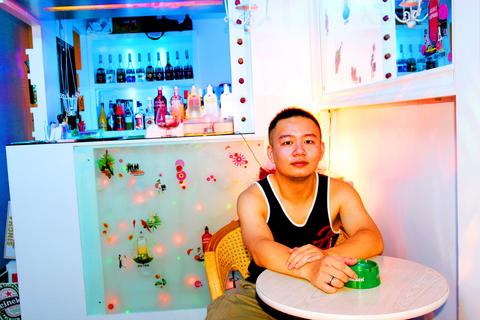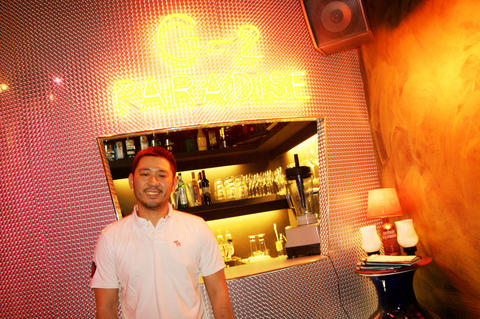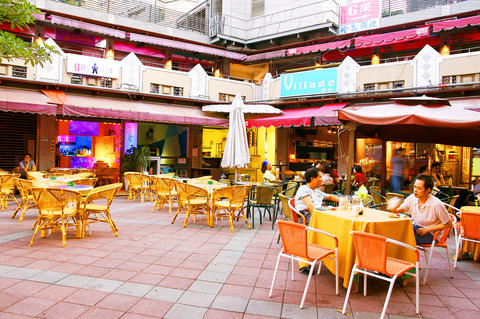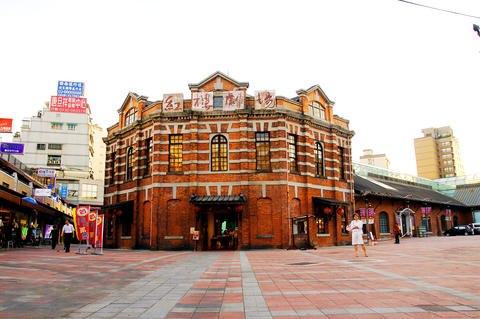"Rainbow Plaza" (彩虹廣場) is an unexpected development at the Red House Theater (紅樓劇場) in Ximen–ding, Taipei. It's the city's first openly gay area.
The public square has become a magnet for the homosexual community following the establishment of around a dozen cafe bars, with names like Gaydar, G-Paradise and Bear Cafe.
Though local office and store workers enjoy their al fresco lattes in the plaza at all times of the day, dusk sees the place flare into life.

Ultraviolet neon signs switch on, fairy lights blink and the volume dial on the sound systems go up a few notches.
If the weather's good on Fridays and Saturdays the plaza is covered with tables full of young people meeting up before heading out to clubs or KTV.
The area and its patrons are a sign that homosexuality in Taipei has been outed from the saunas and late night parks where gay men were previously forced to meet.

"It shows that Taipei has progressed. The area is open-air and it means homosexuals are in the open too," said Bruce Lai (賴盈兆), who's from Taiwan but works in the Shanghai fashion industry.
coming out
"Before we had to go to secret places and hide. It's a sign that homosexuality is accepted," said Lai, who's a frequent visitor to the plaza when he's in town.

Tetsu Huang is part of an investment group that has opened three cafe bars in the past 10 months and has dubbed the area Rainbow Plaza.
"If you go to big cities in America, Europe or Asia they all have their gay areas. This is Taiwan's," said Huang, who asked that we use only his English name, as his family doesn't know he's gay.
"This is a comfortable and healthy place for people to visit. The air is good, there's no traffic and it's a lovely atmosphere. That's why it's so popular," Huang said.

PHOTOS: JULES QUARTLY
The Red House's rainbow (a symbol of gay pride) conversion was news to Taipei City Council.
Its press office expressed mild shock and dealt with our query by referring to Tina Chen (陳慈銘), secretary of the Department of Cultural Affairs.
"I've been there many times for tea and coffee but did not realize [it was gay]," Chen admitted, before adding the city council was supportive of the Lesbian, Gay, Bisexual and Transgender (LGBT) community. "Taipei government treats everyone equally."
Chen cited the council's financial and moral support of the annual gay pride parade since 2003, which ends up in the Red House plaza.
She said there were development plans on the drawing board for the nearby market buildings that would make the area a hot spot for designers and games developers.
The spread of cafe bars predominantly run by gay people for gay people has been privately led and was paradoxically started three years ago by a straight man.
Chiu Lin-hsiang's (邱麟翔) Gourmanes (珈瑪黑咖啡) is universally credited with being the first coffee shop on the block to open late.
According to Chiu it succeeded where many other stores failed because it sold Belgian beers, when few other places in town did so.
Looking good
Other bar owners, however, claimed it was Chiu's good looks that initially attracted gay men to the area.
Either way, G-Paradise and Bear Cafe opened about a year ago and the zone exploded into life.
On the Internet and among some foreigners the area is sometimes referred to as "Little Bear Village" (小熊村), which refers to a type of gay man, usually masculine and hairy.
Tetsu Huang said this was not typical of his patrons, who are mainly Asian and who he defined as "monkeys" (slimmer), muscle monkeys, otters (hairy but not big), pigs (fat), wolves (lean) and cubs (young bears).
Taiwan Tongzhi Hotline Association (同志諮詢熱線) Director of Public Affairs Clemond Hsu (許欣瑞) said the Red House had historical ties to the gay community and was used as a clandestine meeting place when it was a cinema in the 1970s.
Ninety years ago (according to its Web site, www.redplayhouse.com.tw), Red House was a public market, before transforming into a performing arts center. Currently it is used as a showroom and teashop.
Hsu explained Ximending has traditionally been homosexual-friendly and currently has many saunas, restaurants, cafes and gyms that attract gay people.
"We are very glad that such a place now exists. In the past, the media have portrayed homosexuals in a bad way and made it look like a bad thing," Hsu said.
To date, local media have not reported on the scene, though magazines in Tokyo and Singapore have. ETTV (東森電視) recently introduced the plaza's cafe bars but neglected to mention they catered mainly to a gay crowd.
"An area like this can change people's minds. Anyone can go there and see that it's a normal place with normal people," Hsu said.
"In the past we had to operate like a secret society. It's very meaningful that gays now have a space of their own."

The canonical shot of an East Asian city is a night skyline studded with towering apartment and office buildings, bright with neon and plastic signage, a landscape of energy and modernity. Another classic image is the same city seen from above, in which identical apartment towers march across the city, spilling out over nearby geography, like stylized soldiers colonizing new territory in a board game. Densely populated dynamic conurbations of money, technological innovation and convenience, it is hard to see the cities of East Asia as what they truly are: necropolises. Why is this? The East Asian development model, with

June 16 to June 22 The following flyer appeared on the streets of Hsinchu on June 12, 1895: “Taipei has already fallen to the Japanese barbarians, who have brought great misery to our land and people. We heard that the Japanese occupiers will tax our gardens, our houses, our bodies, and even our chickens, dogs, cows and pigs. They wear their hair wild, carve their teeth, tattoo their foreheads, wear strange clothes and speak a strange language. How can we be ruled by such people?” Posted by civilian militia leader Wu Tang-hsing (吳湯興), it was a call to arms to retake

Desperate dads meet in car parks to exchange packets; exhausted parents slip it into their kids’ drinks; families wait months for prescriptions buy it “off label.” But is it worth the risk? “The first time I gave him a gummy, I thought, ‘Oh my God, have I killed him?’ He just passed out in front of the TV. That never happens.” Jen remembers giving her son, David, six, melatonin to help him sleep. She got them from a friend, a pediatrician who gave them to her own child. “It was sort of hilarious. She had half a tub of gummies,

The wide-screen spectacle of Formula One gets a gleaming, rip-roaring workout in Joseph Kosinski’s F1, a fine-tuned machine of a movie that, in its most riveting racing scenes, approaches a kind of high-speed splendor. Kosinski, who last endeavored to put moviegoers in the seat of a fighter jet in Top Gun: Maverick, has moved to the open cockpits of Formula One with much the same affection, if not outright need, for speed. A lot of the same team is back. Jerry Bruckheimer produces. Ehren Kruger, a co-writer on Maverick, takes sole credit here. Hans Zimmer, a co-composer previously, supplies the thumping